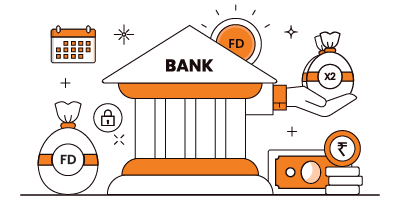Investors dream of growing their wealth at minimum risk. They look for ways to double their money and try multiple ways to achieve it. But, it is impossible to double a person’s investment in a very short span with minimal risk. However, banks in India have introduced a fixed deposit and recurring deposit schemes that doubles the investment money in a fixed period of time with minimum risk. The scheme is the fixed deposit double scheme, and it guarantees double the investment amount as a return. This article covers the Fixed Deposit Double Scheme, its features, and how it is different from a normal FD scheme in detail.
What is a Fixed Deposit Double Scheme?
Banks usually offer FD Double Schemes. These are FD schemes that require investors to deposit a certain sum of money for a fixed tenure. The scheme then doubles the investment in the said tenure. In this scheme, when an investor deposits the money for a predetermined period, the interest remains constant throughout, ensuring the money doubles by the maturity of the scheme.
A Bank Fixed Deposit Double Scheme is an FD scheme and has a fixed tenure. The bank usually defines the minimum investment for this type of term deposit. And the interest rate depends on the tenure of the FD. Moreover, the rate of interest for these schemes usually vary between 4%-8%. Also, the interest is compounded on a quarterly basis. Furthermore, the interest earned on the deposit is reinvested into the scheme. During maturity, the investor gets back double the investment amount in a lump sum (investment plus interest).
The investor doesn’t have the flexibility to choose the investment tenure, nor they have the option of premature withdrawal. Also, only certain banks allow premature withdrawal of FD double schemes. However, the bank allows investors to take a loan against the deposit. Moreover, the minimum investment in this type of term deposit is usually in thousands.
However, the investor has the flexibility to choose the deposit amount. Also, investors can nominate a beneficiary to receive the investment benefit in case of the unfortunate death of the investor.
The interest earned on the deposit is subject to a TDS of 10% if the interest income exceeds INR 40,000 per annum. However, for senior citizens, the TDS is levied if the interest income is above INR 50,000 per annum. In case the investor doesn’t disclose the PAN details, the TDS rate levied by the bank would be 20%. Also, the interest income has to be disclosed while filing taxes under the section ‘Income from Other Sources. Moreover, this interest income is taxable at the investor’s income tax slab rate.
List of Double Deposit schemes
- Bank of India Double Benefit Term Deposit
- SBI Fixed Deposit Double Scheme
- Post office fixed deposit double scheme
- TMB Double Deposit Scheme
- Kishan Vikas Patra Scheme
Features of a Fixed Deposit Double Scheme in Bank
Following are the features of Fixed Deposit Double Schemes:
- Easy and Hassle-free account opening: Individuals can open the FD account easily and without any hassle. They can either physically visit the bank or open the account online at the convenience of their home. All that one needs to follow is the simple account opening procedures.
- Interest Rates: FD Double Schemes offer attractive interest rates. It helps the investors to double their deposits over a certain period of time.
- Flexibility: Investors have the flexibility to choose the deposit amount as per their financial flexibility. Most banks accept deposits ranging from a few thousand to lakhs.
- Loans: Banks offer loans against the FD double schemes. With this, the investors need not worry about breaking the deposit scheme in case of financial emergencies.
- Nomination: Depositors can nominate individuals on their behalf. The nominees will get the deposit amount in case of unforeseen death of the account holder.
- Premature Withdrawals: Certain banks allow premature withdrawals of the deposits. However, these premature withdrawals may come with certain penalties.
Difference Between Double Scheme and Normal Fixed Deposit
Basically, a normal FD scheme and an FD double scheme are the same. In a normal fixed deposit scheme, the depositors can choose the tenure of the deposit and the amount of investment. The tenure usually ranges between a few days to years. The interest from these deposits is either withdrawn at regular intervals or reinvested into the scheme. Depositors get to choose either of the interest options. Longer investment tenures have higher rates of interest. If an investor opts for reinvestment, then the interest and the principal amount is returned on maturity.
On the other hand, for FD double schemes, the tenure of the scheme and the investment amount is fixed. Also, the rate of interest is fixed for the duration of the investment. This ultimately ensures that the investment gets doubled at the end of the investment tenure.
Is TDS deducted on FD Double Scheme income?
Yes, the bank deducts TDS on FD Double Scheme income. The bank cuts TDS if the interest income in a financial year exceeds INR 40,000 for regular citizens and INR 50,000 for senior citizens. The TDS rate is 10% if the investor discloses the PAN Card details. If not, the TDS levied by the bank is 20%.
Frequently Asked Questions
Fixed Deposit double schemes are safe investments as they are offered by banks. These fixed deposits guarantee returns and pays the principal plus the interest in a lump sum at the time of maturity. The investment doubles in the fixed tenure, and investors can invest in this scheme to double their investment.
Banks usually offer Fixed Deposit Double Schemes. These are fixed deposits that require investors to deposit a certain sum of money for a fixed tenure. The scheme then doubles the investment in the said tenure.
A Fixed Deposit Double Scheme is an FD scheme and has a fixed tenure. The bank usually defines the minimum investment for this type of FD. And the interest rate depends on the tenure of the FD. The interest on these schemes usually varies between 4%-8%. Also, the interest is compounded on a quarterly basis. The interest earned on the deposit is reinvested into the scheme. Upon maturity, the investor gets back double the investment amount in a lump sum (investment plus interest).
Under the Fixed Deposit Double Scheme, the investment amount and the tenure are fixed. The interest is reinvested into the scheme. Also, the interest rate on these fixed deposits is constant over the period. Hence, the investment doubles by the end of the predetermined investment period.
Yes, depositors can take a loan against their Fixed Deposit Double Scheme.


















Show comments